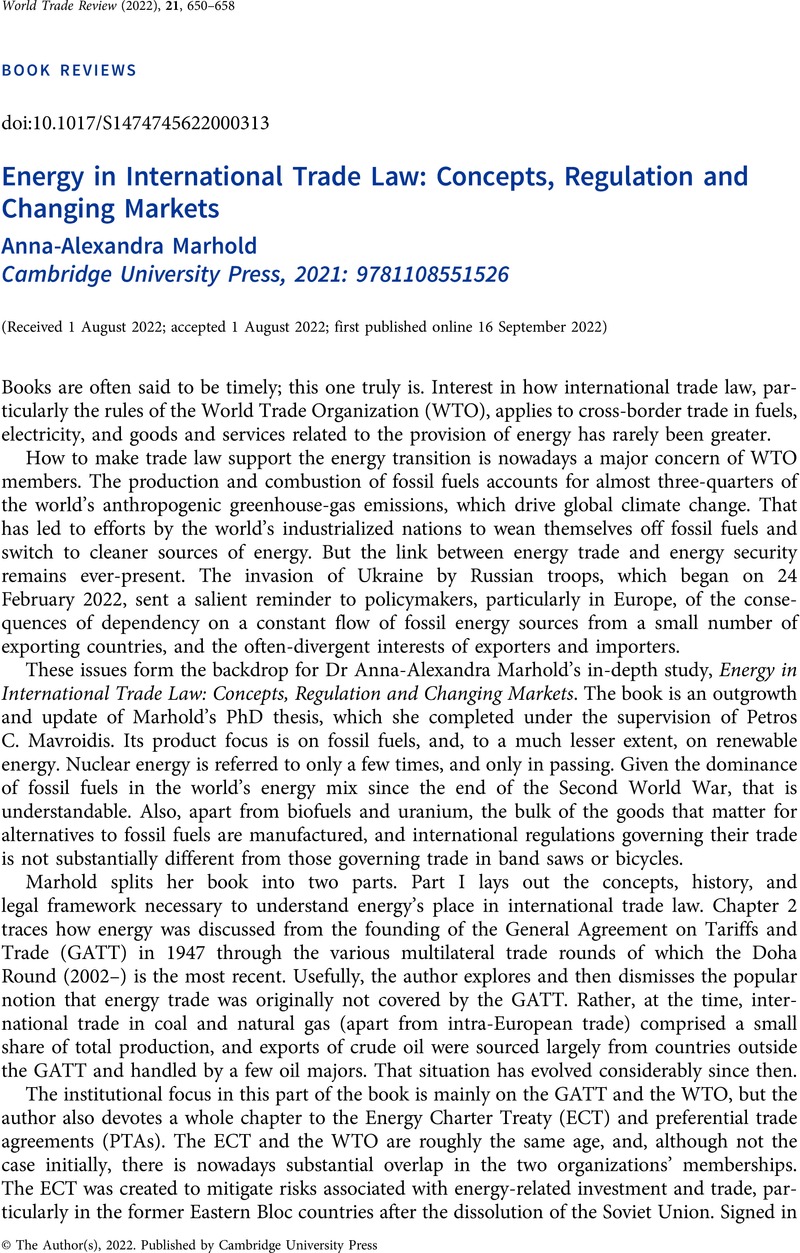Published online by Cambridge University Press: 16 September 2022

1 International Energy Charter, ‘The Energy Charter Process’, www.energycharter.org/process/overview/ (accessed 24 April 2022).
2 Marhold, pp. 143–144.
3 Ibid., p. 145.
4 Ibid., p. 146.
5 The dates refer to when these agreements were signed, which is a better reflection of the evolution of thought on PTAs than when they entered into force, which in some cases (e.g., the EU–Mexico FTA, which entered into force in October 2020) did not occur until many years after they were signed.
6 EU–Ukraine DCFTA, art 270(1). The wording in the EU–Mexico FTA is similar, except that it applies also to raw materials.
7 Marhold, pp. 146–147.
8 EU–Singapore FTA, Article 12.11, para. 3; ‘Free Trade Agreement between the European Union and the Republic of Singapore’, Official Journal of the European Union, 14.112019, at L294/3.
9 Marhold, p. 153.
10 Marhold, p. 155.
11 Marhold, p. 210.
12 Marhold, p. 180.
13 Marhold, p. 185.
14 Chronologically: the OECD (June 2009); the G20 (September 2009); Asia-Pacific Economic Cooperation (November 2009); the United Nations, via Sustainable Development Goal 12.C (September 2015); United Nations Framework Convention on Climate Change (November 2021). The Leaders of the G7 (then the G7) called for a progressive reduction of fossil fuel subsidies in their July 2009 Summit Declaration, but not again until May 2012. They have reiterated that pledge every year since then.
15 WTO, ‘Members discuss possible MC12 deliverables on trade and environmental sustainability’ (28 May 2021), www.wto.org/english/news_e/news21_e/tessd_28may21_e.htm.
16 International Energy Agency, ‘Fossil Fuel Subsidies Database: Fossil fuel consumption subsidies for select countries, 2010–2020’ (June 2021), www.iea.org/data-and-statistics/data-product/fossil-fuel-subsidies-database.
17 Marhold, p. 218.
18 Group of Twenty, ‘G20 Leaders Statement: The Pittsburgh Summit’ (24–25 September 2009), www.g20.utoronto.ca/2009/2009communique0925.html.
19 Marhold, p. 214.
20 WTO (1999) The Legal Texts: The Results of the Uruguay Round of Multilateral Trade Negotiations. Cambridge: Cambridge University Press, p. 231.
21 Parry, I., S. Black and N. Vernon (2021) ‘Still Not Getting Energy Prices Right: A Global and Country Update of Fossil Fuel Subsidies’, IMF Working Paper No. WP/21/236. International Monetary Fund, Washington, DC.
22 Parry et al., p. 2.
23 UNEP, OECD and IISD (2019) Measuring Fossil Fuel Subsidies in the Context of the Sustainable Development Goals. New York: United Nations Environment Programme.
24 OECD and IEA (2021) Update on recent progress in reform of inefficient fossil-fuel subsidies that encourage wasteful consumption www.oecd.org/fossil-fuels/publicationsandfurtherreading/OECD-IEA-G20-Fossil-Fuel-Subsidies-Reform-Update-2021.pdf (accessed 26 April 2022).
25 Marhold, p. 214, note 18.
26 See, for example, US PIRG, ‘End Fossil Fuel Subsidie$’ https://uspirg.org/feature/usp/end-fossil-fuel-subsidies (accessed 26 April 2022).
27 Marhold, p. 250. The two cases the author highlights are India–Solar Cells and EU–Energy Package.
28 WTO, ‘DS476: European Union and its Member States – Certain Measures Relating to the Energy Sector’, www.wto.org/english/tratop_e/dispu_e/cases_e/ds476_e.htm (accessed 30 May 2022).
29 Marhold, p. 264.
30 Ibid., p. 283.